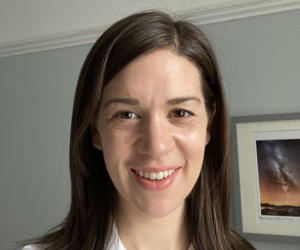Physiotherapy alumna awarded a British Empire Medal (BEM) for services to the NHS
Published: 05 July 2021
Physiotherapy alumna Clare McCarroll, who is Team Lead at the Integrated Community Reablement Service at Merseycare NHS Foundation Trust, was awarded a British Empire Medal (BEM) this year for her services to the NHS.

Alongside her role, Clare is a Research Associate of shortwork as well as an Executive Board Member of Holistic Harmonies. She has also been involved in the ‘Music Makes Us Move’ Project (Bringing Physiotherapy through dance to people living with Dementia), currently in a national programme hosted by the Design Council and Sport England as part of an initiative to identify innovations that help tackle inequalities in physical activity.
Clare’s role involves providing intermediate care within a multi-disciplinary team.
She explains: “Our team works in a community setting to support patients who have been discharged from hospital, and we help those adults at home avoid unnecessary admissions to hospital. We provide integrated care, working alongside colleagues from a range of healthcare disciplines – including physiotherapists, occupational therapists, assistant practitioners, nurses, healthcare practitioner assistants, GPs and pharmacists.”
Speaking on receiving the BEM, Clare says:
"It was a wonderful surprise and very humbling to receive the award. I was very honoured and grateful to receive it, not just for myself but for the profession.
I was really happy to see that physiotherapists were being recognised for the work they had been doing throughout the pandemic, and the impact this work has had on patients’ rehabilitation.
“I have had a great network of support through my managers, my mentor, Joanna McIlmurray and through being part of NHS North West Research and Development Early Career Research Programme.
“The award was really a reflection not just of my work, but of the team’s achievements. We have an incredible team spirit here, which has kept us going through the challenges of the last year.”
Clare explains how the team has adapted to changes brought about by the Covid-19 pandemic:
“It has been a real challenge to make big adjustments while managing the uncertainty of it all. We have had to adapt very quickly to be able to communicate with patients in a digital format.
"Our team covers a large area and we have had to make sure we are linking in with our partner organisations.”
She adds: “Our staff are at the centre of everything, because we couldn’t provide our service without them, and it has been so important to support them and help them cope with the psychological impact of the pandemic. We have a very international team, so it has been particularly hard for staff who have been unable to visit loved ones who live overseas.
“We have also had to think about practicalities such as using the right PPE in the right way to ensure staff and patient safety, as well as ensuring we provide the right type of care and treatment for all of our patients.
Even as restrictions have begun to ease, Clare notes that some people still feel uncomfortable with home visits, meaning virtual and telephone consultations have had to continue for those patients.
Although it has been challenging, the last year has also helped us all reflect on our practice and think about what has changed and what will be different moving forwards.
Speaking about how she has helped the team adjust to these changes, Clare says:
“It has been important to make sure we are checking in with each other because everyone has needed support at different points in the pandemic. We have reignited team meetings, which have helped us have some continuity and certainty. We began meeting face-to-face as soon as we were able to be together on-site, because we really missed this interaction.”
Claire adds that, during team meetings, highlighting patient stories and keeping the patient voice loud and clear has helped the team to focus on something positive and serve as a reminder that they are part of a bigger picture. She notes that giving team members ownership of different aspects of the service has also helped give everyone a sense of greater purpose.
Reflecting on her time at St George’s, Clare says:
“I loved it so much that I came back after my first degree! After studying Physiotherapy, I completed my Masters in Clinical Research.
St George’s encouraged us as students to be inquisitive, to always question what we were doing and why we were doing it so that we were constantly building on our knowledge and developing our skills.
"This reflective approach to my practice has stayed with me throughout my career.
“Something else I particularly enjoyed about the experience was the multi-disciplinary approach St George’s offered.
"I enjoyed working with students from a range of disciplines, and this has helped prepare me for a career in which I am working as part of a multidisciplinary team, with all members pooling together our different strengths and expertise to work towards a common goal.”